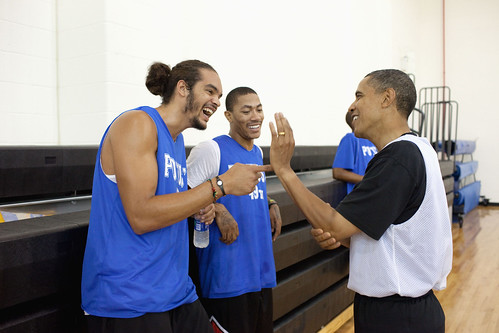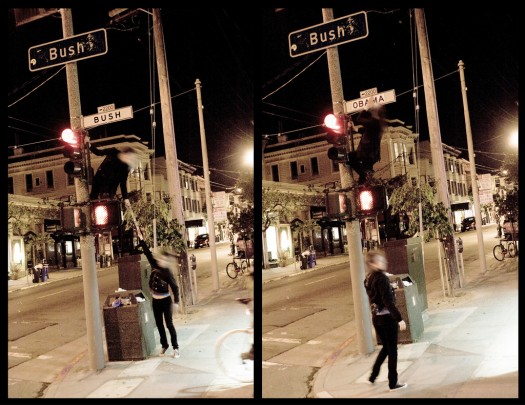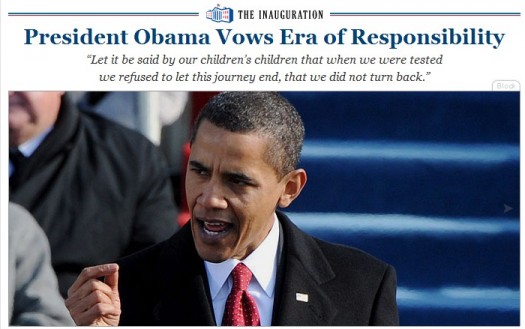There's an intimacy in this that so resonates with me. I mean, it's impossible to imagine that I wouldn't be charmed by the subject matter alone — a President I greatly admire, plus two NBA players. But this moment is especially great, because I love Derrick Rose's game and I will always appreciate that he OD'd on candy before the 2008 NCAA Final with Kansas. And I admire Joakim Noah's gritty post play and his serious media game. And I love that there's genuine emotion in this shot. It has got a little bit of stagey-ness, but it also feels, like I said, intimate, like the photographer took this photo and emailed it to me, and said: "You'd appreciate this."
Category: politics
The NYT's Lens blog recently posted a couple of great articles about the photographers who captured the Tienanmen Square protests in 1989. The first offers four riveting oral histories from photographers who captured the "Tank Man" in his moment of defiance, and the second adds a new twist: this amazing image from street level.
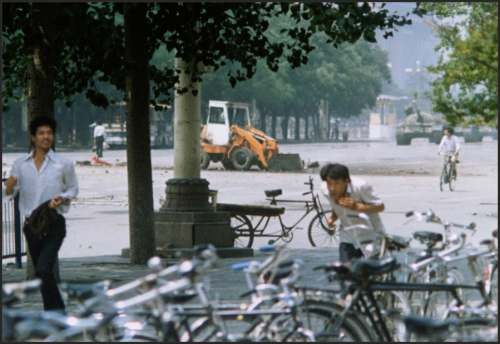 Disorder. People fleeing. This was happening as the Tank Man, seemingly so calm, stood in the street. I also think it's interesting that all the men in the photo are wearing — as a commenter on the NYT blog put it — "the same drab clothes." A true illustration of how much has changed in China in the last 20 years.
Disorder. People fleeing. This was happening as the Tank Man, seemingly so calm, stood in the street. I also think it's interesting that all the men in the photo are wearing — as a commenter on the NYT blog put it — "the same drab clothes." A true illustration of how much has changed in China in the last 20 years.The Roshomon-like details in all of the photographers' stories are vivid and heartbreaking: "Vehicles were smoldering," "a line of students facing a line of soldiers and a column of tanks," "another volley of shots rang out from where the tanks were, and people began ducking, shrieking, stumbling and running," "some guy in a white shirt runs out in front," "a man waving two plastic shopping bags," "waving his jacket and shopping bag," "remonstrating with the tank driver in an act of defiance," "he then disappeared into the crowd," "the PSB (Public Security Bureau) grabbed him and ran away."
And then what happened?
Charlie Cole: "I then placed the tank roll in a plastic film can and wrapped it in a plastic bag and attached it to the flush chain in the tank of the toilet."Stuart Franklin: "The film was smuggled out in a packet of tea by a French student and delivered to the Magnum office in Paris."Jeff Widener: "I gave all my rolls of film to [someone named] Kurt/Kirk who smuggled it back to the A.P. office in his underwear. The long-haired college kid was wearing a dirty Rambo T‑shirt, shorts and sandals." Arthur Tsang Hin Wah: "A colleague rode over on a bike and picked up the film."And Terril Jones, the reporter who captured the shot at street level: "I never published them, and only showed them to a few friends and fellow reporters."And the rest is history. That keeps unfolding, I guess.
These are our core beliefs
What I know about the inner-workings of politics I learned in The Power Broker, and therefore I don't claim to know much other than the sausage-making involved in building the Triborough Bridge. Still, I was struck by the following passage from Ryan Lizza's New Yorker profile of Peter Orszag, the Director of the Office of Management and Budget.
The first budget, [Robert Nabors, an OMB veteran] told me, "was being designed with an eye toward what do we need to do to put the economy back on a more sustainable path? What do we need for economic growth? And what do we need to do in order to transform the country? Those were our overarching principles." The budgeteers took a hyper-rational approach, attempting to determine policy and leave the politics and spin for later. He went on, "One of the things that would probably surprise people is that this wasn't an effort where anybody created a top-line budget number and said, 'This is the number that we have to hit, and that's just that, and we'll fit everything else in.' Or, 'We can't go higher than x on revenue,' or, 'We can't go higher than y on spending.' It was more of a functional budget than anything else: 'This is what we need to do. These are our principles. These are our core beliefs. And as a result this is what our budget looks like.'"
This is probably the kind of thing that gives nightmares to the teabaggers, but I love the idea of goal-oriented budget creation. Why not try to keep your eyes on the prize of actual tangible outcomes like sustainble economic growth when you're wrangling the world's most complicated spreadsheet into submission?
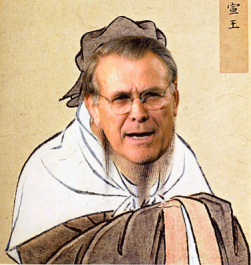
Confucius: To know that we know what we know, and that we do not know what we do not know, that is true knowledge. Donald Rumsfeld, former Secretary of Defense, aka "Rumsfucious:" As we know, there are known knowns. There are things we know we know. We also know there are known unknowns. That is to say: We know there are some things we do not know. But there are also unknown unknowns, the ones we don't know we don't know. — Feb. 12, 2002, Department of Defense news briefingThoreau cites Confucius during a discussion of self-knowledge in Walden, and it reminded me of Ol Rummy. Looks like he was on to something deeper after all. I thought he was talking about intelligence, but he was really getting at "true knowledge." Perhaps the US government should create a Central True Knowledge Agency? Speaking of true knowledge, the entirety of Walden is online.
Okay, one last political thing. In the wee hours before yesterday's inauguration, a genius prankster named Alex Zecca reportedly covered every "Bush" street sign from downtown to the Marina with a sticker that said "Obama." I heard about it when I got into work, but missed the chance to see it for myself. Luckily, Vanessa Naylon saw it happen. Awesome.
Rev. Lowery's "stemwinder"
Jesse Jackson mentioned that he had expected Rev. Joseph Lowery to end the benediction with a "stemwinder." What's a stemwinder? Well, apparently, it's a old-timey term used to describe "a rousing political speech." (Jesse was right, too).
Lord, in the memory of all the saints who from their labors rest, and in the joy of a new beginning, we ask you to help us work for that day when black will not be asked to get in back, when brown can stick around, when yellow will be mellow, when the red man can get ahead, man; and when white will embrace what is right.
Personally, I thought this was a nice way to playfully deflate the pomp, and to test the strictures of political correctness, but the folksy tone seems to have tweaked the guys I watched on Fox News a few minutes ago.1 It's probably worthwhile to note that Lowery was referencing (at the very least) an old blues standard, Big Bill Broonzy's "Black, Brown, and White" — though the lyrics of the song likely have roots and references elsewhere.
I went to an employment office,Got a number 'n' i got in lineThey called everybody's number,But they never did call mineThey said, "if you was white, should be all right,If you was brown, could stick around,But as you black, hmm brother, get back, get back, get back"I hope when sweet victory,With my plough and hoeNow i want you to tell me brother,What you gonna do about the old jim crow?Now if you was white, should be all right,If you was brown, could stick around,But if you black, whoa brother, get back, get back, get back
Considering that Rev. Lowery has been there since the beginning of the Civil Rights Movement — he helped to lead the Montgomery Bus Boycott — I think he's earned the benefit of the doubt (at the very least) when it comes to winding stems. (And as I was writing this, his Wikipedia entry was updated to note that the concluding words were "part of a civil rights chant that Lowery has included in many speeches over the years," linking to a couple of speeches in which he has used the same conclusion). 1 Also, some people are peeved about "white will embrace what is right;" most seem to interpret an insulting insinuation that "white" has not done so yet. I assume these people are themselves white. And that they take everything very, very personally.
President-elect Obama:
Our challenges may be new. The instruments with which we meet them may be new. But those values upon which our success depends — hard work and honesty, courage and fair play, tolerance and curiosity, loyalty and patriotism — these things are old. These things are true. They have been the quiet force of progress throughout our history. What is demanded then is a return to these truths. What is required of us now is a new era of responsibility — a recognition, on the part of every American, that we have duties to ourselves, our nation, and the world, duties that we do not grudgingly accept but rather seize gladly, firm in the knowledge that there is nothing so satisfying to the spirit, so defining of our character, than giving our all to a difficult task.This is the price and the promise of citizenship.…So let us mark this day with remembrance, of who we are and how far we have traveled. In the year of America's birth, in the coldest of months, a small band of patriots huddled by dying campfires on the shores of an icy river. The capital was abandoned. The enemy was advancing. The snow was stained with blood. At a moment when the outcome of our revolution was most in doubt, the father of our nation ordered these words be read to the people:"Let it be told to the future world…that in the depth of winter, when nothing but hope and virtue could survive…that the city and the country, alarmed at one common danger, came forth to meet [it]."America. In the face of our common dangers, in this winter of our hardship, let us remember these timeless words. With hope and virtue, let us brave once more the icy currents, and endure what storms may come. Let it be said by our children's children that when we were tested we refused to let this journey end, that we did not turn back nor did we falter; and with eyes fixed on the horizon and God's grace upon us, we carried forth that great gift of freedom and delivered it safely to future generations.
Read the whole dang thing. It's just as impressive in text as it was in voice.
(The title is from a poet named Tao Lin in a collection called this emotion was a little e‑book).The Internet is like a small town, especially when there's something to disagree about. Recently, some of my favorite Internet citizens got into it over Obama's decision to have poetry at his inauguration.I've always liked George Packer, the New Yorker's man on the ground in the early days of Iraq. I devoured his book about the first year of the occupation, The Assassins' Gate. It tells the stories of a few Iraqis who put their necks on the line to support us when we arrived in 2003, and it comes to mind whenever a conversation turns to the need to find a way out of Iraq. I also read his blog, Interesting Times. He's the kind of journalist who always does his homework, which made it all the more puzzling when he somewhat flippantly criticized Barack Obama's decision to ask Elizabeth Alexander to read a poem at his inauguration:
For many decades American poetry has been a private activity, written by few people and read by few people, lacking the language, rhythm, emotion, and thought that could move large numbers of people in large public settings … [Ed.: Ouch.] … Obama's Inauguration needs no heightening. It'll be its own history, its own poetry.
Ouch. A blanket dismissal? The activity of "a few people?" I started writing a response to this, but Ta-Nehisi Coates of The Atlantic beat me to it. His blog rules. He called out Packer for being prematurely judgmental, and suggested that perhaps hip-hop lyrics were suitably rhythmic and emotive for the occasion. Yes.Lo and behold, Packer just posted what amounts to an apology, and he does so in the best way, comparing the current poetry scene to the NBA in the 1970s:
Contemporary American poetry has too many mansions to be summed up under a throwaway phrase like "private activity.†Its multitude of schools and forms is like the N.B.A. in the nineteen-seventies, when there was no dominant team but a confused contest of warring tribes. And I should have read more of Alexander's work than appears on her Web site, and more carefully, before expressing skepticism that she'll be equal to the occasion on January 20th.
So, the real question is: Who will be the David Stern of 21st century American poetry? Chris Fischbach, I'm looking at you.
Incoming White House chief-of-staff Rahm Emanuel recently discussed the next administration's approach to the financial crisis, telling the Wall Street Journal, "You never want a serious crisis to go to waste." Linking politics, crisis and opportunity, Emanuel's sentiments evoked either Milton Friedman's Capitalism and Freedom or Naomi Klein's The Shock Doctrine, depending on your level of paranoia/distrust of the federal government.I'll admit that I've only skimmed Friedman, but Klein's book is a provocative interpretation of social crisis and the ways in which corporations benefit (and people are exploited) in the wake of a disaster. She holds Friedman accountable for the rise of "disaster capitalism," and she identifies his philosophies as the origin of numerous crises precipitated by governments around the world in the past fifty years:
This is how the shock doctrine works: the original disaster — the coup, the terrorist attack, the market meltdown, the war, the tsunami, the hurricane — puts the entire population into a state of collective shock … Like the terrorized prisoner who gives up the names of his comrades and renounces his faith, shocked societies often gives up things that they would otherwise fiercely protect.
Anyway, what's especially interesting about Emanuel's invocation is that (I suspect) at least some of the new administration's policies will reverse the deregulation that Friedman recommended and that his acolytes implemented. Also, like Friedman, Emanuel is from Chicago. Ironic? Deeply.
